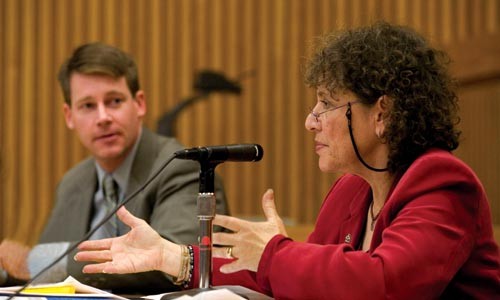
While Marjorie Cohn may have been a cheerleader growing up, today she's anything but. The political activist, social-justice attorney, author and Court TV analyst has become one of President George W. Bush's staunchest critics. A few hours before a Nov. 16 debate at the University of Pittsburgh, she sat down with City Paper to discuss the war, torture and what she really thinks about the President.
Where did your interest in political activism come from? Was it through your work as a lawyer?
As an undergraduate at Stanford in the 1960s, I was very active in the anti-war movement. I actually came out of high school as a cheerleader and a homecoming princess, and when I got to Stanford the war was raging. Many of my friends were facing the draft, and I joined the movement and that set my life on the path of working for social justice. I made the decision to go to law school specifically to use the law for social change.
You're in town debating why the torture of detainees is wrong. It's strange they found someone [Ohio Northern University law professor Michael Lewis] to debate the other side of that argument.
I'm astounded myself that anyone can be on the other side of the so-called torture debate. But we have a new attorney general, Michael Mukasey, who refused to say that water-boarding constitutes torture, even though everyone in the world knows that water-boarding is torture; it's been around since the Spanish Inquisition. ... Most of these [detainees] don't know where the next terrorist attack is going to be and, secondly, studies show that if you torture someone long enough, they'll tell you what you want to know, whether it's true or not.
Under what authority is the government doing this?
Torture violates U.S. law. We have ratified a treaty [The International Covenant on Civil and Political Rights], and when you do that under the constitution it becomes U.S. law. ... The Geneva Convention, ratified by the U.S., outlaws torture and makes torture a war crime. That's why Michael Mukasey would not say that water-boarding is torture: because it would open up Bush, Cheney and company to liability for war crimes.
I think a lot of people laugh it off when war protestors or people in the Middle East say the U.S. has committed war crimes. I'm not saying the President is a war criminal ...
I will call him a war criminal. Dick Cheney is a war criminal, [Condoleezza] Rice, [Donald] Rumsfeld, [Colin] Powell ... I talk about this in my book [Cowboy Republic: Six Ways the Bush Gang Has Defied the Law] that there is strong evidence ... of a common plan to violate the Geneva Convention. ... [T]he commander-in-chief [is] liable for war crimes if they know or should have known that their subordinates would commit them and they did nothing to stop it. That definition fits.
A lot of people think we're regressing in the way that the government is treating the personal liberties of Americans. Do you see that at all?
I would use a stronger word. There is a concerted effort on the part of the Bush administration to decimate civil liberties. The first indication of this was the Patriot Act, which was passed by a shellshocked Congress after 9/11. Many of the provisions in the Patriot Act had been rejected by Congress before 9/11, and yet John Ashcroft rammed that act through Congress, and most members hadn't ever read it. Also, [the U.S. government] was allowed to label U.S. citizens as unlawful enemy combatants and hold them indefinitely.
What do you think we can anticipate from the Bush Administration as his second term enters its final phase?
I think he's going to attack Iran. All the signs point in that direction. A couple of weeks ago, Bush equated World War III with Iran not acquiring nuclear weapons, but acquiring the knowledge of nuclear weapons. I think Bush and Cheney think [that] if they can get us into Iran, it will be harder for the next President to get us out of Iraq. ... In spite of the rhetoric coming out of the president's mouth, an attack on Iran would be as illegal as the so-called Operation Iraqi Freedom was.














